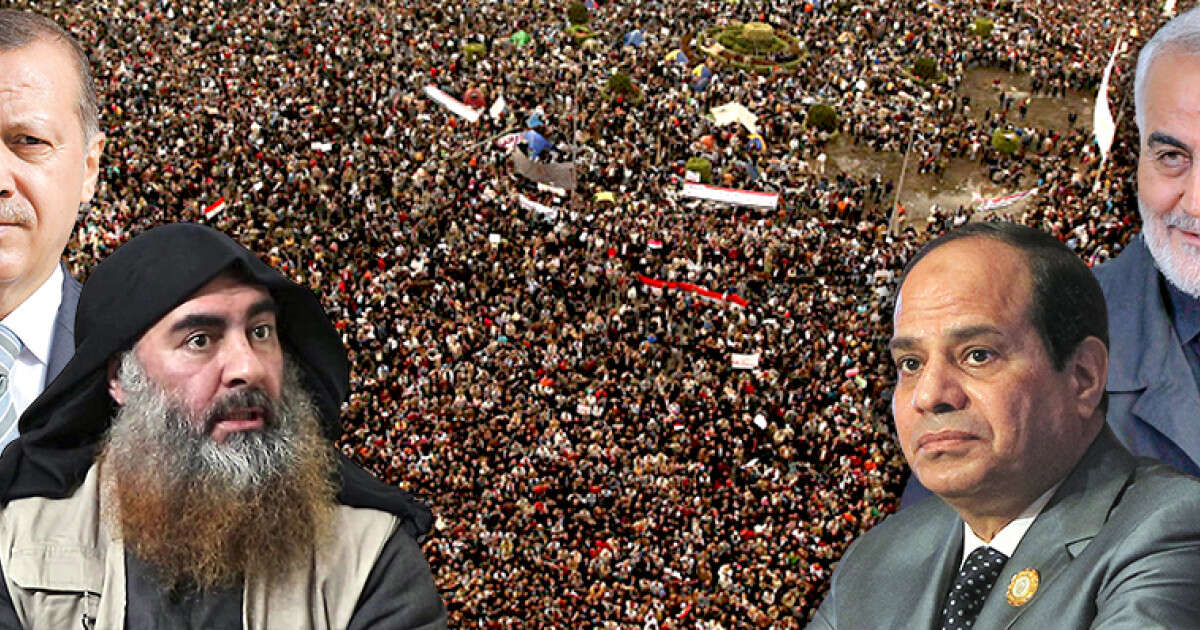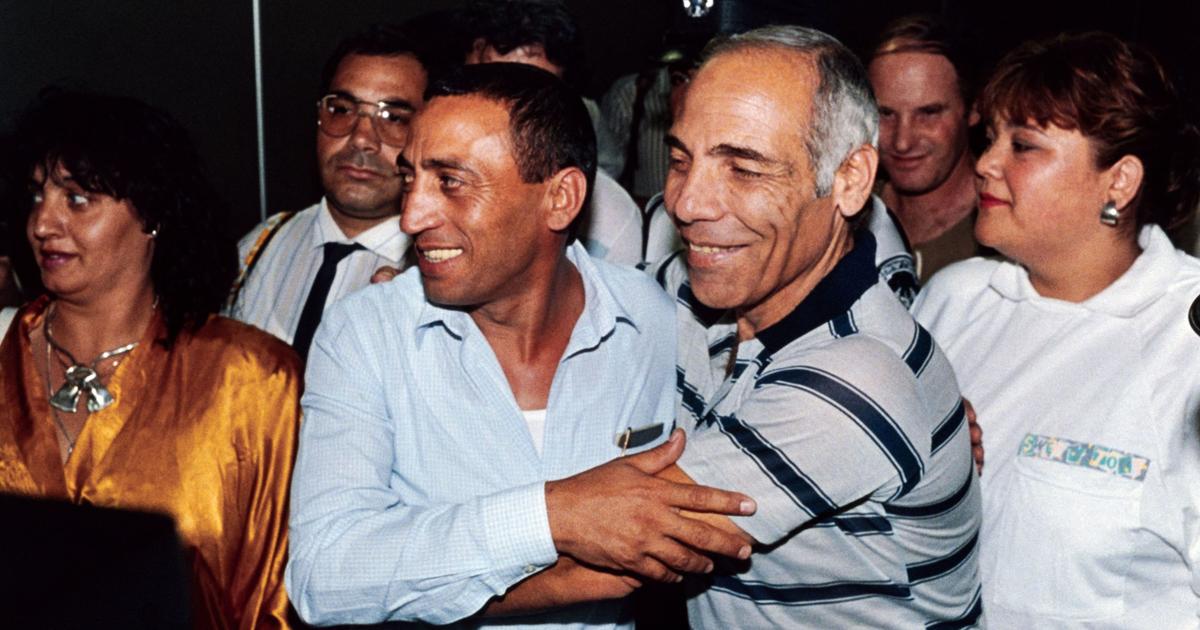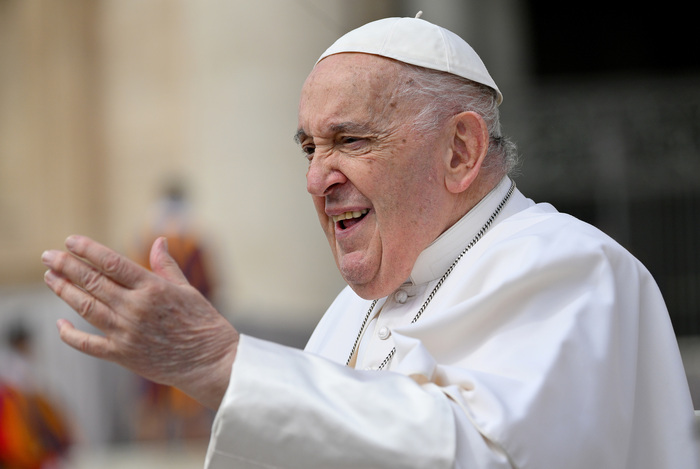The aspiration for change and democracy, which emerged with the Arab Spring, sank in the blood and blood of the Syrian civil war and the rise of ISIS • From Erdogan, through Qassem Suleimani to Al Baghdadi • These are the decade's leaders who chose Israel Today's editors
Middle East leaders // Photo: Reuters, IPF, IPI, GettyImages
The unprecedented jolt of the Middle East over the past decade has been a source of endless research, articles and constant media coverage. The Arab Spring revolutions, the rise of ISIS, the fall of borders and their return alongside the crash of some of the old regimes, constitute an unprecedented series of events in the region's history. The editors of "Israel Today" have selected the four people of the Middle East for you.
Recipe Taipei Erdogan
(Dean Samuel Elms)
Recep Tayyip Erdogan completes a decade of ups and downs for him, but with one downside - he is the first Turkish leader with the longest term, even more than the founder of the Republic of Turkey Mustafa Kemal Ataturk.
• What a decade we had! Go to the special "Summary of the Decade" page
• Disagree with our choices? Let's choose your people and decade-long events
• Think you know everything that happened in the last decade? Enter the huge decade quiz
At Turkey's foreign relations level, the president has led a significant change: from a pro-Western country close to the US and Israel - Ankara has become close to the Russian government and a pan-Islamic public leader. Acquisition of S-400 air defense systems from Russia and the upcoming deal to buy fifth-generation aircraft - Sukhoi Su-57, which could shatter the relationship with President Donald Trump's government, however, has no doubt that the roots of foreign policy are rooted in "domestic" domestic policies.
The turnaround of the decade in Turkey as a whole and of Erdogan in particular took place without a shadow of a doubt on July 15, 2016 - when the attempted military coup took place. While particularly reminiscent of that attempted coup attempt by the president who was on a private holiday in Marmaris, he finished with his hand on top the next day.
This led Erdogan to a book closure campaign. After the coup attempt, at least 300 people were killed and more than 2,100 were wounded - starting with a wave of arrests involving more than 40,000 people - about a quarter of them soldiers. On the contrary, more than three years later, arrests are still being made - remembering the same coup attempt attributed to exiled opposition leader Fethullah Golan.
More on:
Erdogan's Revenge: Senior Academic Prisoner
The troubles of the Sultan Erdogan
Erdogan again lies: "Israel prevents harvest in Jerusalem"
Is this the man who will reject Erdogan?
The key step was a referendum, as part of strengthening Erdogan's self-status on April 16, 2017 - calling on Turkey's citizens to approve eighteen amendments to the constitution. Within the same proposals, innocent-looking proposals such as increasing the number of MPs were raised from 550 to 600, and those that would clearly position the head of the Justice and Development Party as the undisputed senior power.
Turkish President, Recipe Taip Erdogan // Photo: Reuters
Among those amendments was Article 104, which states that the president is the head of state and prime minister, with the exclusive power to appoint and fire a vice president and ministers. Also, according to 119 - the president can declare an emergency subject to parliament. A pressed majority of 51.41% approved the amendments and gave the president a power that has not been seen since the "Young Turks" reign.
Erdogan's strong power allowed both past and present president to fire Kurdish mayors elected on "striving for power, as well as strengthening the status of close Islamists in the country. The significance of the Justice Party's defeat and development in last March can only be understood in the next decade, as Turks face Towards 2023 - the next general election date.
Abdel Fattah a-Sisi
(Dawn Kleiman)
Few in Egypt knew the youngest general in the Supreme Military Council before 2013. In the Muslim Brotherhood that came to power a year earlier, it was hoped that the introverted officer, who was also closest to Islam, would agree with the far-reaching changes in the constitution. This is how Abdel Fattah a-Sisi found himself in the powerful role of Egypt's defense minister. It ended in a coup. The Muslim Brotherhood has trampled, and is currently in its worst crisis since it was founded in the late 1920s.
The fifth general in the chain of officers who has ruled the Nile country since 1952 has enjoyed political stability thanks to the fatigue of the Egyptian public, who fears the alternative - an Islamist rule that will penetrate all walks of life - almost like the army's long arm. However, many others are unwilling to accept the compromise between the hammer and the anvil. But it's too early to tell if the September 2019 protests herald a new Arab Spring.
Despite the criticism against the fairy shutdown and silencing its opponents on the regular claim that it is the Muslim Brotherhood, A-Sisi is determined to get the poor state out of the mud. Under his baton, the country experienced moderate growth thanks to IMF reforms, loans and investments from Arab Gulf countries. This, in addition to reviving the oil and gas industry. However, the cuts in the state budget subsidies have hampered the living standards of many Egyptians, which is another fuel for the recent protest.
More on:
A-sissy on the way to being Mubarak
A-Sisi will serve as President of Egypt until 2034
The mysterious contractor behind the protest in Egypt
Assei asked for censorship - but the interview about the cooperation with Israel will be broadcast
The issue of cutting subsidies should not be underestimated. It was another move that only an aissi rule could lead. The paralyzing fear of deteriorating into Iraq and Syria-style chaos allowed the new Pharaoh to also transfer sovereignty in the islands of Tiran and Snapir to Saudi Arabia. His critics claimed that he was selling the state's land for a handful of dollars, but it seems as if Sissi is internalizing what his opponents do not understand - Egypt needs money - not land.
Egyptian President Abdul Fateh a-Sisi // Photo: IPA
Contrary to the Nasser revolutionaries, the Sadat ruler and the drowsiness of the Mubarak regime - the leadership of a solid, determined and consistent A-Sisi. Under the radar, a bloody war is waging in the Sinai Peninsula that he leads against ISIS cells. The smuggling tunnels on the border with the Gaza Strip are almost migrant. At the same time, he has made Cairo a key player in mediating between Israel and Hamas - all without drawing too much attention.
And yet, the masses who have lost the welfare state are demanding rewards - political rights, unimaginable democracy. It is precisely this - A-Sisi will not give them.
Abu Bakr to Baghdadi
(Net bar)
It is rare for many terrorists to become a recognized leader in the international arena, but Abu Bakrq al Baghdadi, an Iraqi official who declared himself the ruler of the Islamic State, is just such a figure.
There is nothing left of the caliphate declared by Al-Baghdadi, not the head of which was liquidated by a US strike in Syria, not the huge territories it conquered and not even the mosque, which was destroyed by the Iraqi army while ISIS militants barricaded it in the battle for the liberation of Mosul.
But the Islamic State's meteoric rise to power in Iraq and Syria and newspaper headlines in the West, as well as its violent crash, is largely linked to the identity and decisions of the man who founded it, an anonymous religious scholar who has become one of the most known terrorists in history.
More on:
After the liquidation: ISIS appointed an heir to al-Baghdadi
"In the end we found out that the messenger was al-Baghdadi's brother"
After the liquidation: ISIS appointed an heir to al-Baghdadi
US report: ISIS leader eliminated in special operation in Syria
Al-Baghdadi intended to re-establish the Islamic Caliphate as a first step to the Islamic revolution. His vision included a strong, totalitarian state apparatus and the mobilization of hundreds of thousands of fighters from around the Muslim world. His vision sparked problems with Al Qaeda leadership from the beginning.
Iraq, devastated by a decade of unending war, has disintegrated before ISIS. Al-Baghdadi called the operation "Breaking the Walls," an unprecedented terrorist attack that has left over a thousand people killed across Iraq each month. Most of the province of Inbar fell by ISIS personnel. In 2013, ISIS men broke into Abu Ghraib prison and released hundreds of members of the organization, including senior commanders.
But along with Al-Baghdadi's success came his appetite. In a famous speech at the Mosque of El Nuri in Mosul, Al-Baghdadi announced the creation of a new caliphate, the Islamic State in Iraq and Syria, ISIS. Al-Baghdadi sent his fighters across the border, equipped with cannons and armored loot from the battered Iraqi army.
In keeping with al-Baghdadi's teachings, ISIS state institutions took root everywhere the organization's terrorists came. ISIS's state-building project that included a distorted economic and legal system that allowed slavery, human trafficking and the imposition of corporal punishment. Baghdadi's vision attracted not only jihadist warriors from around the world, but also devout Muslims who sought to build a new life in Islamist "Utopia".
But Baghdadi's success was also the forerunner of his end. ISIS's extremism has prevented it from forming alliances, even with relatively sympathetic elements such as Erdogan's regime in Turkey. The unimaginable acts of cruelty on the part of ISIS brought the wrath of the United States on ISIS's head and the choking ring around the strongholds of the organization was shrinking.
Al-Baghdadi succeeded with great talent, and with the help of a series of experienced deputies and security personnel, hid well from his soul-seekers, in fact, until the force of the United States Navy's "Sea Lions" unit captured him in a hiding place on his territory ruled by his opponents, Jabhat al Nusra , In northern Syria.
According to various reports, Al-Baghdadi crawled into a hideout tunnel with his three children and blew himself to death with an explosive belt on his body. In a confused but powerful speech, US President Donald Trump summed up Baghdad's end: "The man who went on the horrors of so many in the world died while frightened and scared. He died like a dog."
Muhammad bin Salman
(Dawn Kleiman)
The Hashokji affair, the war in Yemen, the confrontation with Iran, the change of tone with regard to Israel and the turning of the home front to the Palestinian issue - if we asked ourselves a decade ago - which Arab state would lead the agenda of the Arab world, we would probably guess that this is Egypt. But the transfer of the wand from the sons of the founder of the kingdom, Abd al-Aziz al-Saud, to the third generation headed by Muhammad bin Salman - heralded a new leader in the Middle East.
Egypt has dwindled in its internal struggles between the Muslim Brotherhood and the General regime. Syria was torn apart in the civil war. Saddam's Iraq was and is not. Artificial Jordan never had real leadership potential. Above all, the rich and fundamentalist Arab kingdom shone. It has opened up to the world in media and social media interviews, and Muhammad bin Salman - has become her face - for better or worse. With a flattering smile and glittering eyes - he always has all the answers.
In 2016, Prince presented Saudi Arabia's vision for 2030. A grandiose program that aims to strengthen Islamic and national identity in the tribal state, enable "healthy and meaningful" lives, diversify the economy that relies on the oil industry and boost growth, reduce unemployment, increase government efficiency. And encourage "CSR". Detailed plans have been written for each and every destination, which should make Saudi Arabia a leading and prosperous country. By the way, the latest "candies" in the realm of women's status must be understood. The rights do not interest Ben Salman, but the low rates of participation of women in the Saudi labor market.
More on:
Ben Salman met with A-Sisi in Cairo
Mohammed bin Salman corresponded with the commander of the Khashokji killers
Report: Ben Salman is considering a summit with Trump and Netanyahu
Saudi Crown Prince's double match
But the way from the bombastic statements to the revolution that the heir promises is still long and pitted. Here are some of them: In Yemen, the death toll has long crossed the 100,000 dead, while the Houthi struggle is not even close. A humanitarian disaster that only catastrophes in Syria and Iraq. This tragedy is named after Saudi Arabia's defense minister - Ben Salman - and has already led the country into a fierce diplomatic dispute with Canada.
If not enough in the southern sector, in September 2019, two Kik and Kharis oil facilities were attacked. Despite monstrous arms deals with the United States, Riyadh was not prepared for the threat of drones from the north. Quite badly, about two months later, the Aramco government oil company declared the most expensive issue in history. Not for the issue was undertaken in the realm. Worldwide gave up the invention. , The giant company had trouble explaining how they would protect the facilities.
Saudi Crown Prince Muhammad bin Salman // Photo: IP
In addition, more and more social activists in the country are saying that Ben Salman's governing mechanisms are following them and not violating basic human rights. Just recently, indictments were filed against two Saudis in the United States who worked on Twitter to provide espionage services for their government. Incidents of this kind, coupled with the assassination of journalist Jamal Hashokji in the Consulate in Istanbul, are questioning Riyadh's relationship with Washington the day after President Donald Trump.
In any case, the attention drawn by Ben Salman is reminiscent of other Middle Eastern figures who have become addicted to media appearances and dramatic statements. Gamal Abd a-Nasser, Saddam Hussein, Yasser Arafat, Bashar al-Assad to some extent - each in turn proved how dangerous the airwaves are as a delusional drug when the reality in the field does not bode well. Because there is a moment when you are blown away by yourself - and then you fall.
Kassem Suleimani
(Net bar)
Kassem Suleimani is the only person who is not a head of state in the present and in the past who has succeeded in entering the decade's finale. The Quds Force commander of the Revolutionary Guards, the foreign arm of the Iranian regime, has managed to create an Iranian control corridor through Baghdad, Damascus and Beirut over the past decade and fulfill Tehran's desire to become a regional power.
Thoroughly, meticulously and quite a bit of charisma, Suleimani - the son of an impoverished farmer from the west of the country - has succeeded in building a system of political alliances and winning the many proxy wars into which his men have been deployed throughout the Middle East. Suleimani began his career as a young Revolutionary Guards officer during the Iran-Iraq War. His battlefield heroism and Suleimani's commitment to the goal made him a rising star in the organization very quickly.
In 1998, he was appointed Commander of Quds Force, the long arm of the Revolutionary Guards outside Iran's borders. Under Suleimani's hand, the Qods Force became a leading factor in almost every conflict and conflict in the Middle East. In the past decade, Suleimani has been able to organize and launch five successful Shiite Houthi rebellions against the Yemeni government. When Saudi Arabia and the UAE invaded Yemen, the rebels succeeded in protecting the capital Sana'a and even firing missiles from Iran at Saudi Arabian cities.
More on:
Will Qasim Suleimani replace Rouhani?
"Israel tried to kill me during my visit to Lebanon in 2006"
Israel made it clear to Suleimani: Your people are not immune to injury either
The Revolutionary Guards on Direction: General Suleimani's Headache
In Iraq, Suleimani's men succeeded in turning the Shiite government into Tehran's remarks, after the Quds force militias helped the Iraqi army defeat ISIS and push its terrorists out of Iraq. In Lebanon, the support provided by Tehran to Hezbollah has allowed him to establish himself as the country's leading political force and create a balance of terror vis-à-vis Israel.
Qods Force Commander Kassem Suleimani // Photo: Reuters
Now, with the construction of an Iranian military presence in southern Syria, Suleimani has been preparing to achieve the goal declared by the regime for decades, and to reach an indirect confrontation with Israel, in Israel. For all his accomplishments, dedication and willingness to place himself at the heart of the battlefield, Qassem Suleimani was nicknamed the "living martyr" among Shiites in Iraq.
Now that voices in the conservative camp in Tehran are calling for Suleimani as presidential candidate, the power and influence of the "living martyr" on the Teheran regime is widening. Suleimani presents a difficult challenge for Israel and for the Middle East, which they will have to face at the beginning of the new decade.





/cloudfront-eu-central-1.images.arcpublishing.com/prisa/JNAMK37HFIZKML76SWBTDTD3QI.jpg)








